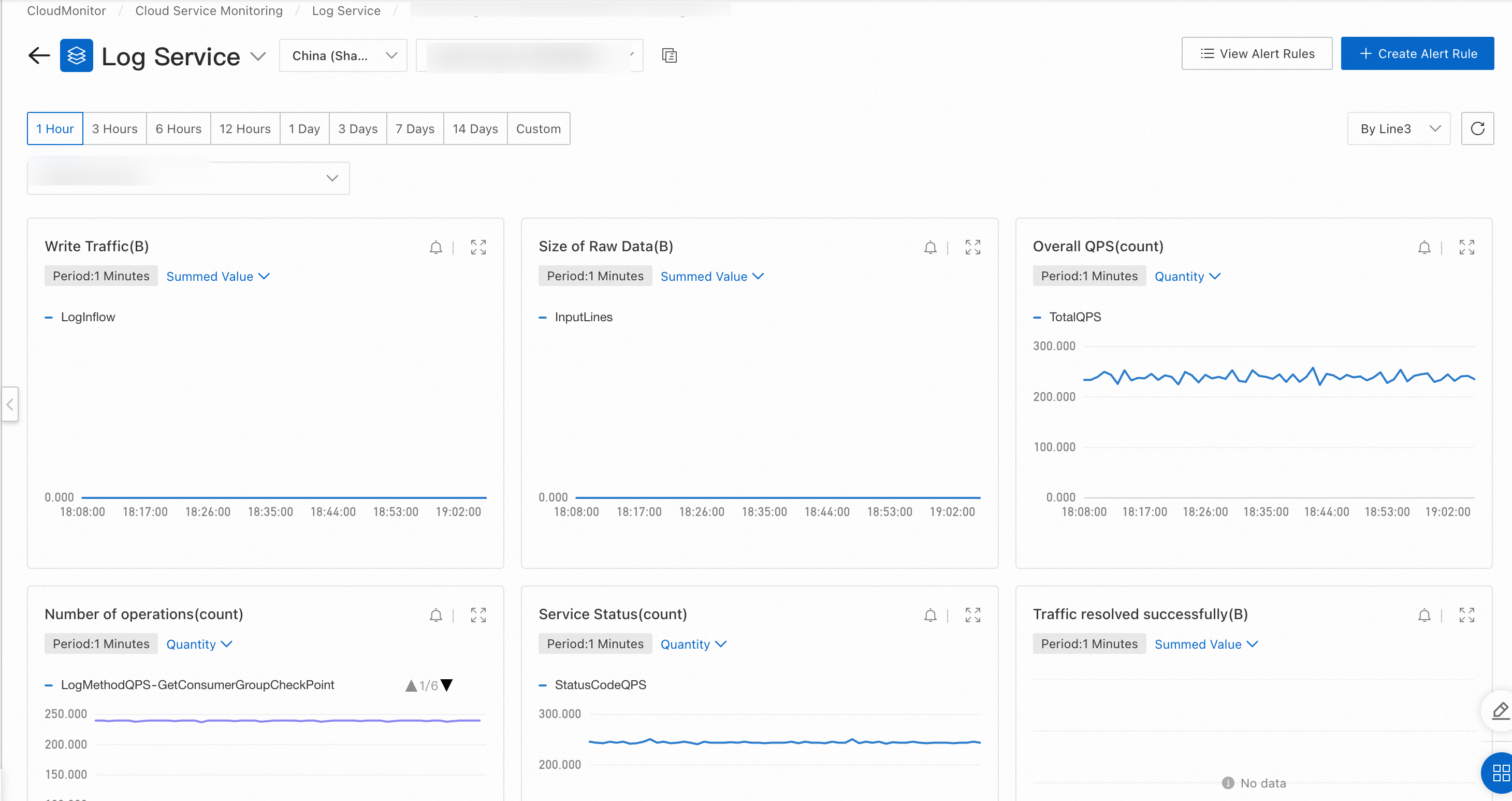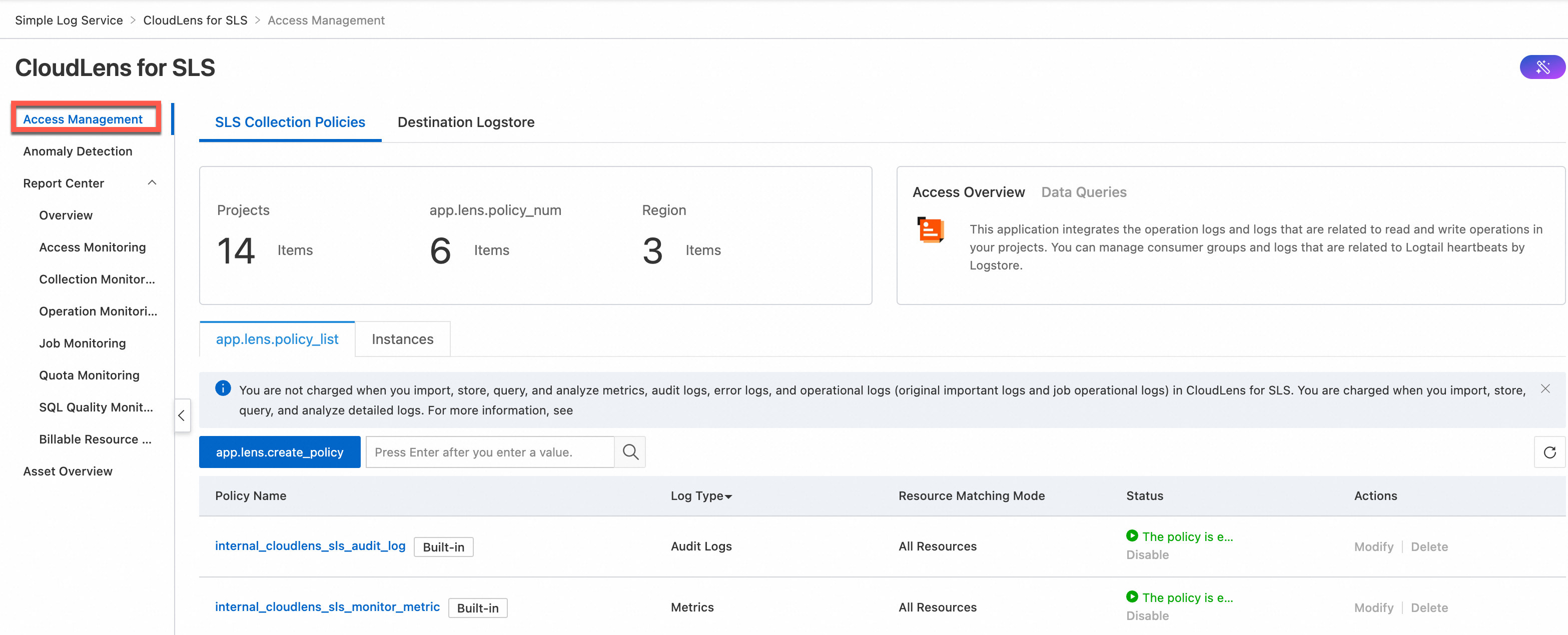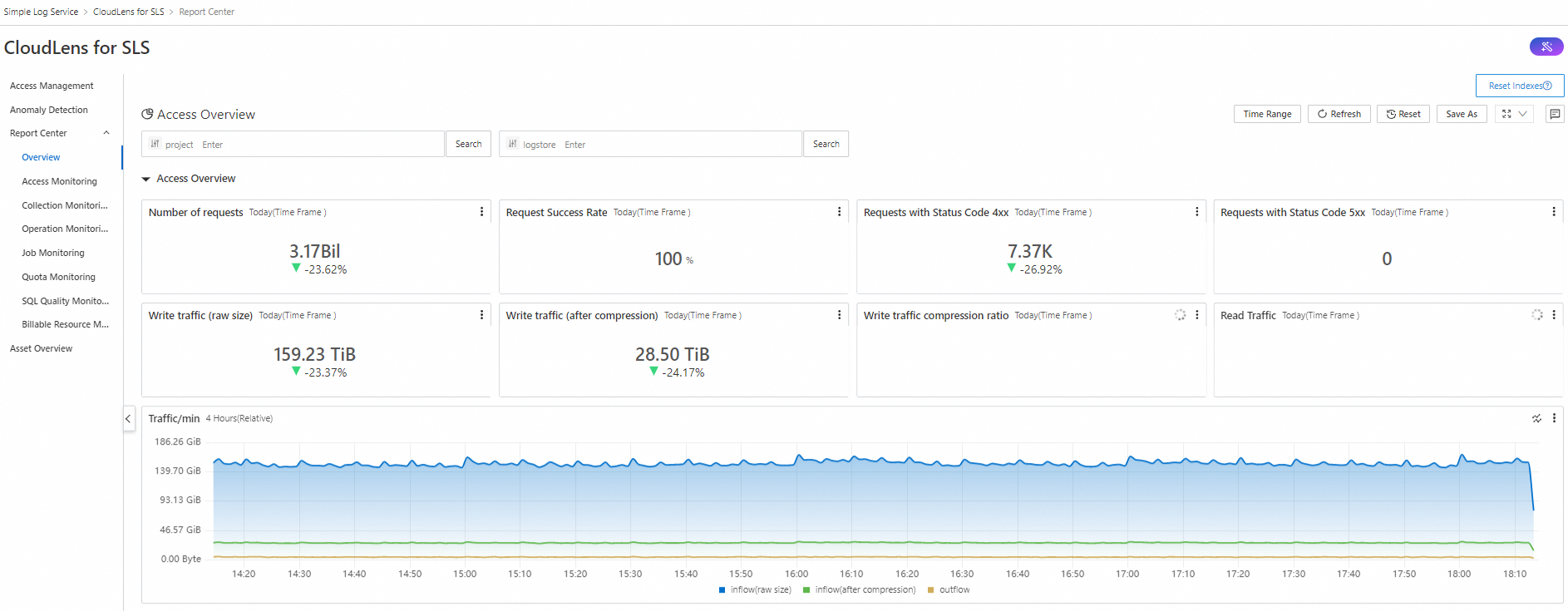If you want to monitor the usage of Simple Log Service resources based on project operation logs, Logtail error logs, operational logs of data shipping jobs, and project write traffic, you can use the CloudLens for SLS application provided by Simple Log Service or the cloud service monitoring feature provided by CloudMonitor. This topic provides an overview of the two monitoring methods.
Background information
Use CloudMonitor

If you use this method, you are not charged fees. However, you can view only limited metrics, such as project write traffic, total queries per second (QPS), raw data size, number of log lines that are collected by Logtail, and read traffic. For more information, visit CloudMonitor Metric Query. You can also configure alert rules to monitor resource usage. If an alert is triggered, CloudMonitor sends an alert notification. This way, you can obtain the usage of your resources at the earliest opportunity.
For more information about how to use CloudMonitor to monitor Simple Log Service, see Use CloudMonitor to monitor the resource usage of Simple Log Service.
(Recommend) Use CloudLens for SLS
The service log and project monitoring features are incorporated into the CloudLens for SLS application. We recommend that you use the application to monitor Simple Log Service.
You are not charged for the CloudLens for SLS application. However, you are charged for the important logs, job operational logs, and billing logs that are generated after you enable the application. For more information about the billing of the logs, see Billing.
The application allows you to manage all projects and Logstores that meet the specified conditions within your Alibaba Cloud account in a centralized manner. For more information about conditions, see Limits.

The application allows you to enable log collection for instance logs and global logs with a few clicks and manage the log collection status in a centralized manner. Instance logs are classified into important logs, detailed logs, and job operational logs. Global logs are classified into audit logs, billing logs, error logs, and metric-related logs.
NoteYou can view only instance logs and global logs that are generated after you enable the log collection feature.
Important logs record the consumption delay of consumer groups for each Logstore. Important logs also record the errors, heartbeats, and statistics of Logtail. The logs are stored in a Logstore named internal-diagnostic_log of a specified project.
Detailed logs record the operations that create, modify, update, and delete resources in a project. Detailed logs also record data read and write operations. The logs are stored in a Logstore named internal-operation_log of a specified project.
Job operational logs record the error and latency information about jobs such as data import jobs of the new version, data shipping jobs of the new version, and Scheduled SQL jobs. The logs are stored in a Logstore named internal-diagnostic_log of a specified project.
Audit logs record the operations that create, modify, update, and delete resources in all projects within your Alibaba Cloud account. The logs are stored in a Logstore named internal-audit_log of a specified project.
Billing logs record billable resource data. The logs are generated by Cost Manager. The logs are stored in Tablestore and are automatically updated on a daily basis. For more information, see Bill data.
NoteThe first time you enable the log collection feature for billing logs, the feature requires approximately 1 hour to 2 hours to import logs. The amount of time that is required to import logs varies based on the amount of billing logs.
Only Alibaba Cloud public cloud users can enable the log collection feature for billing logs.
After you enable the log collection feature for billing logs, you cannot disable the feature.
Error logs record the errors of the operations that create, modify, update, and delete resources and the errors of data read and write operations in all projects within your Alibaba Cloud account. The logs are stored in a Logstore named internal-error_log of a specified project.
Metric-related logs record the traffic, requests, and latency of each project and each Logstore. The metrics are stored in a Metricstore named internal-monitor-metric of a specified project.
For more information, see Service logs.

CloudLens for SLS provides alert rules such as baseline alert rules, interval-valued comparison alert rules, and periodicity-valued comparison alert rules. You can use the alert rules to monitor the usage of resources such as projects, Logtail, and consumer groups. CloudLens for SLS supports different notification methods, such as text messages, DingTalk messages, emails, voice calls, and custom webhooks. For more information, see Configure alerts.

The application provides the following types of reports: Overview, Access Monitoring, Collection Monitoring, Operation Monitoring, Job Monitoring, Quota Monitoring, SQL Quality Monitoring, and Billable Resource Monitoring. For more information, see View data reports.

The application allows you to view the quota information of all projects and Logstores that meet the specified conditions within your Alibaba Cloud account. For more information about conditions, see Limits.

References
For more information about how to use CloudMonitor to monitor Simple Log Service, see Use CloudMonitor to monitor the resource usage of Simple Log Service.
For more information about the best practices of using CloudLens for SLS to monitor Simple Log Service, see Use CloudLens for SLS to analyze resource usage, Use CloudLens for SLS to monitor project resource quotas, and Use CloudLens for SLS to monitor Simple Log Service.
For more information about the billing, supported regions, and resource profiles of CloudLens for SLS, see Usage notes of CloudLens for SLS. The resources include projects, Logstores, Metricstores, and dashboards.